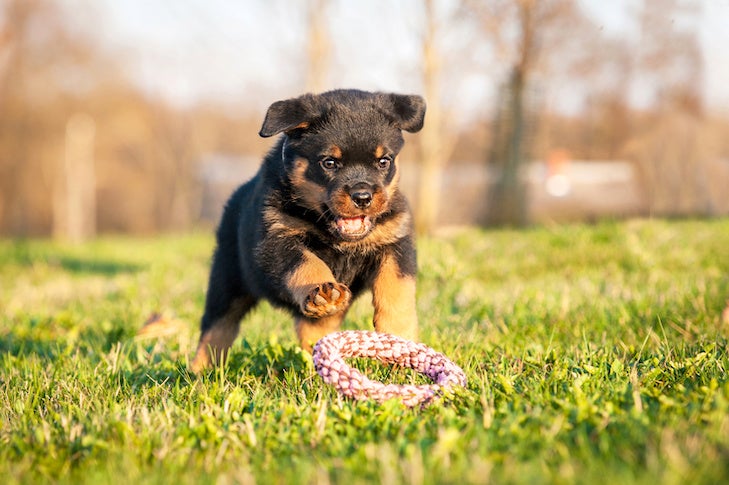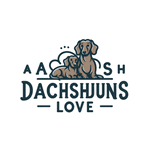The Rottweiler dachshund mix, also known as the Doxieweiler, is a captivating blend of two iconic breeds. This mixed breed inherits the strength, loyalty, and protective nature of the Rottweiler, coupled with the playful, stubborn, and courageous spirit of the Dachshund. The result is a dog that is both intimidating in appearance and surprisingly sweet in personality.
If you are considering adding a Rottweiler Dachshund mix to your family, there are several important factors to consider. Understanding the parent breeds, their temperament and personality traits, training and exercise needs, potential health concerns, and finding a reputable breeder or rescue organization are all crucial elements in making an informed decision. In this article, we will delve into all of these aspects to help you gain a better understanding of this unique and striking breed.
Contents
- 1 The Allure of the Doxieweiler: Temperament and Personality
- 2 Training and Exercise Needs: Balancing Rottweiler Strength with Doxie Spirit
- 3 Health Considerations: Potential for Genetic Issues
- 4 Finding a Doxieweiler: Responsible Breeders and Rescue Options
- 5 Living with a Doxieweiler: Making the Right Choice for Your Lifestyle
- 6 Conclusion
The Allure of the Doxieweiler: Temperament and Personality

One of the main draws of the Rottweiler Dachshund mix is their unique temperament and personality. As with any mixed breed, it is essential to understand the characteristics of both parent breeds to get a sense of what to expect from a Doxieweiler.
Rottweiler Temperament
The Rottweiler is often perceived as a tough and imposing dog due to their muscular build and black and tan coat. However, beneath their fierce appearance lies a loving and loyal companion. Rottweilers were originally bred as working dogs, and their strong work ethic and desire to please make them excellent family pets.
Rottweilers are known for their unwavering devotion to their owners and will go to great lengths to protect their loved ones. While this trait makes them ideal guard dogs, it also means they can be wary of strangers and may require proper socialization from a young age. They are intelligent, trainable, and thrive on having a job to do, whether it be herding or performing obedience tasks.
Dachshund Temperament
Dachshunds, also known as wiener dogs or sausage dogs, have a long and low-slung body with short legs, making them instantly recognizable. Despite their small stature, Dachshunds possess a bold and independent personality. They were originally bred for hunting badgers, and this fearless nature is still evident in their character today.
Dachshunds are known for their playful and mischievous nature, making them a favorite among families. However, they can also be stubborn and have a strong prey drive, making them prone to chasing smaller animals. Early socialization and training are crucial to ensure a well-rounded and obedient Dachshund.
The Doxieweiler: A Perfect Combination
The Rottweiler Dachshund mix takes the best qualities of both parent breeds to create a canine companion that is truly one-of-a-kind. They inherit the loyalty and protectiveness of the Rottweiler while also possessing the playfulness and courage of the Dachshund. This combination makes for a dog that is both loving towards its family and can also hold its own in any situation.
Training and Exercise Needs: Balancing Rottweiler Strength with Doxie Spirit

As with any dog, providing proper training and exercise for a Rottweiler Dachshund mix is essential to maintain their physical and mental well-being. However, due to the distinct characteristics of each breed, finding a balance between their exercise needs can be challenging.
Training a Doxieweiler
Both the Rottweiler and Dachshund are intelligent breeds, but they can have different training styles and requirements. Rottweilers respond well to firm and consistent training methods, whereas Dachshunds may require more patience and a gentle approach. Therefore, it is crucial to understand your dog’s individual needs and adapt your training techniques accordingly.
The Rottweiler Dachshund mix has the potential to excel in various activities, including obedience, agility, and even tracking. As mentioned previously, they thrive on having a job to do, so providing them with mental stimulation through training and activities is necessary for their overall well-being.
Exercise Requirements
Rottweilers are known for their strength and endurance, while Dachshunds have an energetic and playful nature. When it comes to exercise, it is essential to find a balance between these two traits to ensure your Doxieweiler stays fit and healthy.
A daily walk or jog for at least 30 minutes is recommended for Rottweiler Dachshund mixes. However, they also enjoy playing and running around in a secure yard, making them suitable for families with active lifestyles. It is crucial to note that Dachshunds are prone to back issues due to their long spine, so excessive jumping or rough play should be avoided.
Health Considerations: Potential for Genetic Issues

Mixed breeds often inherit healthier genes from their parent breeds, but there is still a chance for genetic health issues to arise. It is crucial to be aware of any potential health concerns in both Rottweilers and Dachshunds to know what to look out for in a Rottweiler Dachshund mix.
Common Health Problems in Rottweilers
Rottweilers are generally a healthy breed, but like all dogs, they are predisposed to certain health issues. Some of the most common health problems in Rottweilers include hip dysplasia, bloat, and elbow dysplasia.
Hip dysplasia is a condition in which the thighbone does not fit properly into the hip joint, causing pain and mobility issues. Bloat, also known as gastric dilation-volvulus (GDV), is a life-threatening condition that occurs when a dog’s stomach fills with gas and twists on itself. Elbow dysplasia is a degenerative disease that affects a dog’s elbow joint and can cause lameness and discomfort.
Common Health Problems in Dachshunds
Dachshunds are prone to back problems, including intervertebral disc disease (IVDD). This condition occurs when the intervertebral discs of the spine become compressed or ruptured, causing pain and potential paralysis. Dachshunds are also susceptible to obesity, which can exacerbate any existing back issues.
Other health concerns in Dachshunds include dental problems, eye conditions such as cataracts, and epilepsy. These conditions can also be passed down to Rottweiler Dachshund mixes, so it is essential to monitor their health closely and take preventative measures where possible.
Finding a Doxieweiler: Responsible Breeders and Rescue Options
When looking for a Rottweiler Dachshund mix, it is crucial to find a responsible breeder or rescue organization. Here are some key things to consider before bringing home your new Doxieweiler:
Breeder or Rescue Organization?
There are pros and cons to both choosing a breeder or adopting from a rescue organization. While working with a reputable breeder can provide you with specific information about the puppy’s parents and lineage, adoption from a rescue organization gives an abandoned dog a chance at a loving home. Whichever route you choose, ensure that the breeder or rescue organization is ethical and genuinely cares for the dogs’ well-being.
What to Look for in a Breeder?
If you choose to go through a breeder, it is essential to research and ask the right questions to ensure they are reputable and ethical. A responsible breeder should be knowledgeable about the parent breeds, provide proper health testing for their dogs, and allow you to see the puppies’ living conditions and meet the parents. They should also provide you with a contract and health guarantee for your puppy.
Adopting from a Rescue Organization
Rescue organizations often have Doxieweilers available for adoption, as well as purebred Rottweilers and Dachshunds. Before adopting from a rescue organization, it is crucial to ask about the dog’s history and any known health issues. The organization should also provide thorough information about the dog’s temperament and behavior to ensure a suitable match for your lifestyle.
Living with a Doxieweiler: Making the Right Choice for Your Lifestyle

The Doxieweiler is a unique breed that may not be suitable for every household. While they make excellent family pets, they require an owner who can provide proper training and exercise, as well as handle their protective nature. Here are some factors to consider before welcoming a Doxieweiler into your home:
Family Compatibility
Doxieweilers can make great family pets, but they may not be suitable for families with very young children due to their potential to be protective of their owners. Proper socialization and training can help curb this behavior, but it is essential to monitor interactions between your Doxieweiler and young children.
Living Space
As mentioned previously, Doxieweilers are active dogs and require regular exercise. Therefore, they may not be well-suited for apartment living or small spaces. Having access to a secure yard where they can run and play is ideal for this breed.
Time Commitment
Rottweiler Dachshund mixes are intelligent and thrive on having a job to do, whether it be through training, playing, or other activities. They require a significant time commitment from their owners to ensure they receive proper training, exercise, and attention. If you have a busy lifestyle that does not allow for this, a Doxieweiler may not be the best choice for you.
Conclusion
The Rottweiler Dachshund mix, or Doxieweiler, is a unique and captivating breed that brings together the strength and loyalty of the Rottweiler with the playfulness and courage of the Dachshund. They make excellent family pets but require an owner who can provide proper training, exercise, and socialization. When considering adding a Doxieweiler to your family, it is crucial to research and understand both parent breeds’ traits and potential health concerns. Whether you choose to work with a reputable breeder or adopt from a rescue organization, providing a loving and suitable home for your Doxieweiler is key to ensuring a happy and healthy companion.
